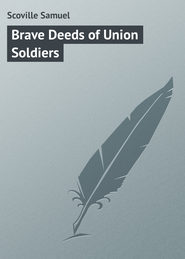По всем вопросам обращайтесь на: info@litportal.ru
(©) 2003-2024.
✖
Brave Deeds of Union Soldiers
Настройки чтения
Размер шрифта
Высота строк
Поля
There was a long pause while the general studied the scout.
"You shall have the men," he said finally.
Andrews saluted and left the tent. That night twenty-four men from three regiments were told that they were to have the first chance to volunteer for secret and dangerous service. Not a man chosen refused to serve. The next evening they were told to meet at a great boulder at sunset about a mile below the camp and wait until joined by their captain. Each man was furnished with the camp countersign as well as a special watchword by which they could know each other. One by one the men gathered at dusk, recognized each other by the watchword and sat down in the brush back of the boulder to wait. Just at dark there was a rustling in the underbrush at the other side of the road and the scout stepped out, joined them and gave the countersign. Without a word, he moved to the thick bushes at one corner of the boulder and pushing them aside showed a tiny hidden path which wound through the brush. Into this he stepped and beckoned them to follow. The path twisted back and forth among the great stones and trees and through patches of underbrush and the men in single file followed Andrews. Finally nearly a mile from the road, he led them down into a dense thicket in a little ravine. There the brush had been cut out so as to make a kind of room in the thicket about ten feet square. When they were all inside, the scout motioned them to sit down and then circled around through the underbrush and doubled back on his track so as to make sure that they had not been followed by any spy. Then he returned and lighted a small lantern which hung to one of the saplings and for the first time his men had a good look at their captain. As usual, Andrews wasted no time.
"Boys," he said simply, "I have chosen you to come with me and capture a train from an army and then run it two hundred miles through the enemy's country. We will have to pass every train we meet and while we are doing this we must tear up a lot of track and burn down two bridges. There is every chance of being wrecked or shot and if we are captured, we will be hung for spies. It is a desperate chance and I picked you fellows out as the best men in the whole army to take such a chance. If any of you think it is too dangerous, now is the time to stand up and draw out."
There was a long pause. Each man tried to see what his companions were thinking of in the dim light.
"Well, captain," at last drawled a long, lank chap with a comical face, who had the reputation of being the worst daredevil in his regiment, "I would like to stand up for you've got me kind of scared, but my foot's asleep and I guess I'll have to go with you."
"That's the way I feel," said the man next to him, as every one laughed, and the same answer went all around the circle.
In a whisper the scout then outlined his plan. The men were to change their uniforms and put on the butternut-colored clothes of the South and to carry no arms except a revolver and bowie-knife. Then they were to cross the country on foot until they got to Chattanooga and were then to go back on their tracks by train and meet at a little town called Marietta in the middle of Georgia. No one would, of course, suspect men coming out of a Confederate city to be Union soldiers. If questioned they were to say that they were Kentuckians on their way to join the Southern army. At Marietta they were to take rooms at the Marietta Hotel and meet at the scout's room on the following Saturday morning at two o'clock.
Disguised as a quinine seller, Andrews reached Marietta ahead of the others. At the time appointed, he sat fully dressed in the silent hotel waiting for the arrival of his little company and wondering how many would appear. Just as the town clock struck the hour from the old-fashioned court house, there came a light tapping at the door and one by one nineteen of the twenty-four glided in and reported for duty. All had gone through various adventures and several had only escaped capture by quick thinking and cool action. One of the missing ones had been delayed by a wreck and did not reach Marietta in time, two others were forced to enlist in the Southern army, and two more reached Marietta but by some mistake did not join the others. The twenty who were left, however, were the kind of men whose courage flares highest when things seem most desperate and they were not at all discouraged by the loss of a fifth of their force, and they all agreed with Brown, the man whose foot had been asleep, when he drawled out in his comical way, "The fewer fellows the more fun for those who are left."
After reporting, they went back to their rooms and got what sleep they could. At daylight they were all at the ticket office in time for the north-bound mail train. In order to prevent any suspicion, each man bought a ticket for a different station along the line in the direction of Chattanooga. Eight miles out of Marietta was a little station called Big Shanty where the train was scheduled to stop twenty minutes for breakfast. It was a lonely place at the foot of Kenesaw Mountain and there were only the station, a freight-house, a restaurant and one or two dwelling houses. Andrews had planned to capture the train there, believing that there would be few, if any, bystanders at so small a place early in the morning. As the train came around the curve of the mountain, however, the scout and his men, who were scattered through the train, were horrified to see scores of tents showing white through the morning mist. A detachment of Confederate soldiers was in camp there and it was now necessary for the little squad of Union soldiers to capture the train not only from its crew and passengers, but under the very eyes of a regiment. There was no flinching. The minute the train stopped there was the usual wild scramble by the passengers for breakfast in which the engineer, fireman and conductor joined. In a minute the engine was left entirely unguarded. In those days engines were named like steamboats, and this one had been christened "General." Andrews and his men loitered behind. In his squad were two engineers and a fireman. These at once hurried forward and began to uncouple the engine with its tender and three baggage-cars. The rest of the party grouped around, playing the part of bystanders, but with their hands on their revolvers, for within a dozen feet of the engine stood a sentry with his loaded musket in his hand watching the whole thing, while other sentries and a large group of soldiers were only a few yards farther off. The men worked desperately at the coupling and finally succeeded in freeing the cars. Then the engineers and fireman sprang into the cab of the engine while Andrews stood with his hand on the rail and foot on the step, and the rest of the band tumbled into the baggage-cars. This was the most critical moment of all, for although the watching soldiers might think it natural to change the crew, yet their suspicions would certainly be aroused at the sight of fifteen men climbing into baggage-cars. The nearest sentry cocked his musket and stepped forward to investigate. At this moment Brown climbed into the engine along with one of the engineers, coolly smoking a cigar. Poking his head out of the window he called back as if to one of the crew, "Tell those fellows not to eat up all the breakfast. We'll be back just as soon as we can take those other cars on at the siding." All this time Andrews was standing with his foot on the step watching the men enter the baggage-cars. The track was on a high bank and it was necessary for the first man to be raised up on the shoulders of two others in order to open the door. Once inside, the other men were tossed up to him and he pulled them in like bags of meal. Finally there were only two left and these jumped, caught the outstretched hands of two inside and were hauled up into the car. Not until then did Andrews step aboard under the very nose of the suspicious sentry. The engineer was so anxious to start that he pulled the throttle wide open and for a few seconds the wheels spun round and round without catching on the rails. He finally slowed up enough to allow the wheels to bite and the engine started off with a jerk which took all the soldiers in the baggage-cars off their feet. Just at this moment the fat engineer waddled out of the eating-house shouting at the top of his voice, "Stop, thief! Stop, thief!" He was followed by the fireman who bellowed to the sentry, "Shoot 'em, shoot 'em! They're Yanks!" It was too late. The General was taking the first curve on two wheels, leaving the quiet little station swarming and buzzing like a hornet's nest struck by a stone. The train had been captured without losing a man.
"You shall have the men," he said finally.
Andrews saluted and left the tent. That night twenty-four men from three regiments were told that they were to have the first chance to volunteer for secret and dangerous service. Not a man chosen refused to serve. The next evening they were told to meet at a great boulder at sunset about a mile below the camp and wait until joined by their captain. Each man was furnished with the camp countersign as well as a special watchword by which they could know each other. One by one the men gathered at dusk, recognized each other by the watchword and sat down in the brush back of the boulder to wait. Just at dark there was a rustling in the underbrush at the other side of the road and the scout stepped out, joined them and gave the countersign. Without a word, he moved to the thick bushes at one corner of the boulder and pushing them aside showed a tiny hidden path which wound through the brush. Into this he stepped and beckoned them to follow. The path twisted back and forth among the great stones and trees and through patches of underbrush and the men in single file followed Andrews. Finally nearly a mile from the road, he led them down into a dense thicket in a little ravine. There the brush had been cut out so as to make a kind of room in the thicket about ten feet square. When they were all inside, the scout motioned them to sit down and then circled around through the underbrush and doubled back on his track so as to make sure that they had not been followed by any spy. Then he returned and lighted a small lantern which hung to one of the saplings and for the first time his men had a good look at their captain. As usual, Andrews wasted no time.
"Boys," he said simply, "I have chosen you to come with me and capture a train from an army and then run it two hundred miles through the enemy's country. We will have to pass every train we meet and while we are doing this we must tear up a lot of track and burn down two bridges. There is every chance of being wrecked or shot and if we are captured, we will be hung for spies. It is a desperate chance and I picked you fellows out as the best men in the whole army to take such a chance. If any of you think it is too dangerous, now is the time to stand up and draw out."
There was a long pause. Each man tried to see what his companions were thinking of in the dim light.
"Well, captain," at last drawled a long, lank chap with a comical face, who had the reputation of being the worst daredevil in his regiment, "I would like to stand up for you've got me kind of scared, but my foot's asleep and I guess I'll have to go with you."
"That's the way I feel," said the man next to him, as every one laughed, and the same answer went all around the circle.
In a whisper the scout then outlined his plan. The men were to change their uniforms and put on the butternut-colored clothes of the South and to carry no arms except a revolver and bowie-knife. Then they were to cross the country on foot until they got to Chattanooga and were then to go back on their tracks by train and meet at a little town called Marietta in the middle of Georgia. No one would, of course, suspect men coming out of a Confederate city to be Union soldiers. If questioned they were to say that they were Kentuckians on their way to join the Southern army. At Marietta they were to take rooms at the Marietta Hotel and meet at the scout's room on the following Saturday morning at two o'clock.
Disguised as a quinine seller, Andrews reached Marietta ahead of the others. At the time appointed, he sat fully dressed in the silent hotel waiting for the arrival of his little company and wondering how many would appear. Just as the town clock struck the hour from the old-fashioned court house, there came a light tapping at the door and one by one nineteen of the twenty-four glided in and reported for duty. All had gone through various adventures and several had only escaped capture by quick thinking and cool action. One of the missing ones had been delayed by a wreck and did not reach Marietta in time, two others were forced to enlist in the Southern army, and two more reached Marietta but by some mistake did not join the others. The twenty who were left, however, were the kind of men whose courage flares highest when things seem most desperate and they were not at all discouraged by the loss of a fifth of their force, and they all agreed with Brown, the man whose foot had been asleep, when he drawled out in his comical way, "The fewer fellows the more fun for those who are left."
After reporting, they went back to their rooms and got what sleep they could. At daylight they were all at the ticket office in time for the north-bound mail train. In order to prevent any suspicion, each man bought a ticket for a different station along the line in the direction of Chattanooga. Eight miles out of Marietta was a little station called Big Shanty where the train was scheduled to stop twenty minutes for breakfast. It was a lonely place at the foot of Kenesaw Mountain and there were only the station, a freight-house, a restaurant and one or two dwelling houses. Andrews had planned to capture the train there, believing that there would be few, if any, bystanders at so small a place early in the morning. As the train came around the curve of the mountain, however, the scout and his men, who were scattered through the train, were horrified to see scores of tents showing white through the morning mist. A detachment of Confederate soldiers was in camp there and it was now necessary for the little squad of Union soldiers to capture the train not only from its crew and passengers, but under the very eyes of a regiment. There was no flinching. The minute the train stopped there was the usual wild scramble by the passengers for breakfast in which the engineer, fireman and conductor joined. In a minute the engine was left entirely unguarded. In those days engines were named like steamboats, and this one had been christened "General." Andrews and his men loitered behind. In his squad were two engineers and a fireman. These at once hurried forward and began to uncouple the engine with its tender and three baggage-cars. The rest of the party grouped around, playing the part of bystanders, but with their hands on their revolvers, for within a dozen feet of the engine stood a sentry with his loaded musket in his hand watching the whole thing, while other sentries and a large group of soldiers were only a few yards farther off. The men worked desperately at the coupling and finally succeeded in freeing the cars. Then the engineers and fireman sprang into the cab of the engine while Andrews stood with his hand on the rail and foot on the step, and the rest of the band tumbled into the baggage-cars. This was the most critical moment of all, for although the watching soldiers might think it natural to change the crew, yet their suspicions would certainly be aroused at the sight of fifteen men climbing into baggage-cars. The nearest sentry cocked his musket and stepped forward to investigate. At this moment Brown climbed into the engine along with one of the engineers, coolly smoking a cigar. Poking his head out of the window he called back as if to one of the crew, "Tell those fellows not to eat up all the breakfast. We'll be back just as soon as we can take those other cars on at the siding." All this time Andrews was standing with his foot on the step watching the men enter the baggage-cars. The track was on a high bank and it was necessary for the first man to be raised up on the shoulders of two others in order to open the door. Once inside, the other men were tossed up to him and he pulled them in like bags of meal. Finally there were only two left and these jumped, caught the outstretched hands of two inside and were hauled up into the car. Not until then did Andrews step aboard under the very nose of the suspicious sentry. The engineer was so anxious to start that he pulled the throttle wide open and for a few seconds the wheels spun round and round without catching on the rails. He finally slowed up enough to allow the wheels to bite and the engine started off with a jerk which took all the soldiers in the baggage-cars off their feet. Just at this moment the fat engineer waddled out of the eating-house shouting at the top of his voice, "Stop, thief! Stop, thief!" He was followed by the fireman who bellowed to the sentry, "Shoot 'em, shoot 'em! They're Yanks!" It was too late. The General was taking the first curve on two wheels, leaving the quiet little station swarming and buzzing like a hornet's nest struck by a stone. The train had been captured without losing a man.









